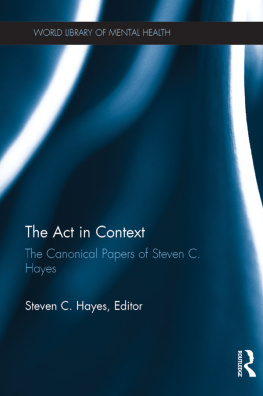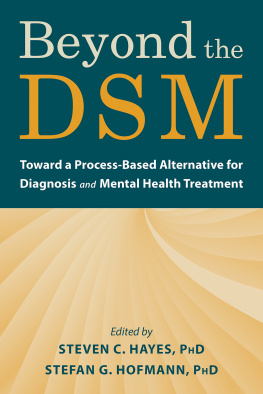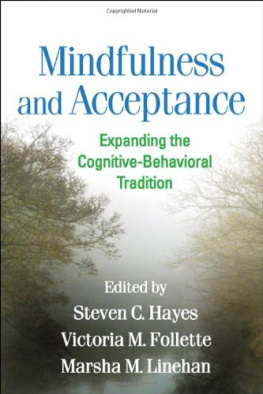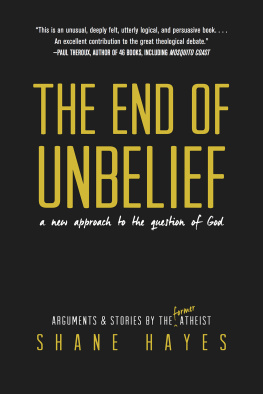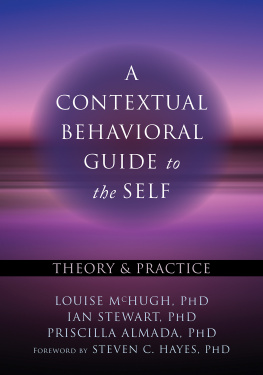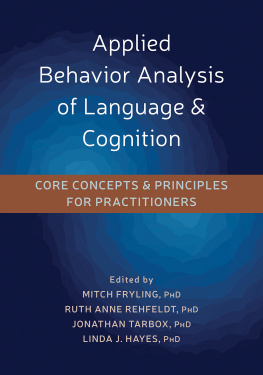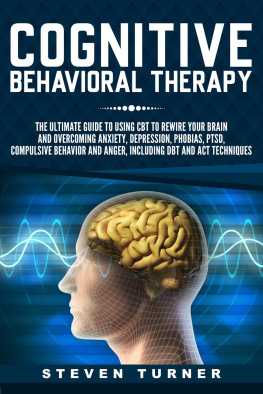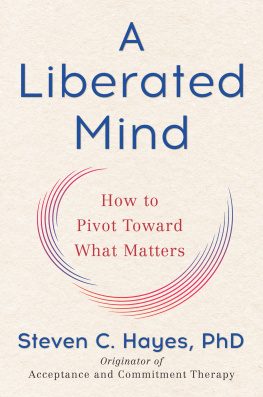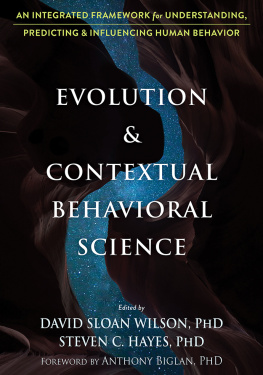The Act in Context
The Canonical Papers of Steven C. Hayes
Steven C. Hayes, Editor

First published 2016
by Routledge
711 Third Avenue, New York, NY 10017
and by Routledge
27 Church Road, Hove, East Sussex BN3 2FA
Routledge is an imprint of the Taylor & Francis Group, an informa business
2016 Taylor & Francis
The right of the editor to be identified as the author of the editorial material, and of the authors for their individual chapters, has been asserted in accordance with sections 77 and 78 of the Copyright, Designs and Patents Act 1988.
All rights reserved. No part of this book may be reprinted or reproduced or utilised in any form or by any electronic, mechanical, or other means, now known or hereafter invented, including photocopying and recording, or in any information storage or retrieval system, without permission in writing from the publishers.
Trademark notice: Product or corporate names may be trademarks or registered trademarks, and are used only for identification and explanation without intent to infringe.
Library of Congress Cataloging-in-Publication Data
Hayes, Steven C.[Papers. Selections]Acts in context : the canonical papers of Steven C. Hayes / Steven C. Hayes.
pages cm
Includes bibliographical references and index.
1.Context effects (Psychology)2.Cognitive therapy. 3.Behavior therapy.4.Psychotherapy.I.Title.
BF315.2.H39 2015
150.19'43dc23
2015019895
ISBN: 978-1-138-81860-6 (hbk)
ISBN: 978-1-315-74513-8 (ebk)
Typeset in Abode Caslon
by Apex CoVantage, LLC
Contents
Steven C. Hayes
Steven C. Hayes
Fredrick Chin and Steven C. Hayes
Robert D. Zettle and Steven C. Hayes
Steven C. Hayes
Steven C. Hayes
Steven C. Hayes, Linda J. Hayes, and Hayne W. Reese
Steven C. Hayes and Aaron J. Brownstein
Steven C. Hayes
Steven C. Hayes
Fredrick Chin and Steven C. Hayes
Steven C. Hayes and Linda J. Hayes
9The Treatment Utility of Assessment: A Functional Approach to Evaluating Assessment Quality
Steven C. Hayes, Rosemery O. Nelson, and Robin Jarrett
Steven C. Hayes, Kelly G. Wilson, Elizabeth V. Gifford, Victoria M. Follette, and Kirk Strosahl
Fredrick Chin and Steven C. Hayes
Steven C. Hayes
Steven C. Hayes
Steven C. Hayes, Jason Luoma, Frank W. Bond, Akihiko Masuda, and Jason Lillis
Steven C. Hayes, Dermot Barnes-Holmes, and Kelly G. Wilson
Steven C. Hayes and Fredrick Chin
Professional and Personal History
Steven C. Hayes, University of Nevada
This book is about the construction of a functional contextual approach in psychology and linking that approach to the other behavioral and life sciences. It is about human complexity, unpacked and opened to a pragmatic science of change.
The core idea inside pragmatism is behavioral function. Imagine a human being engaging in an action, any action. It does not matter what it is: raising a hand, making a statement, scratching a backside. If we ask you, the reader, What is this person doing? and the word doing is understood functionally, you will have to add something to this imaginary situation.
To accomplish this goal you cannot just list the form of the actions or describe them in molecular detail, because none of this tells you what the function is or how that function can be used to organize an ongoing behavioral stream into useful units. Action in a functional sense does not exist alone and cut off. It does not and cannot occur in a vacuum, as if a mere bundling of muscle twitches can tell us the nature of psychological events. To speak functionally you will have to add in the history of the person engaging in such actions and what occurred in the persons history before and after similar actions. You will have to examine the grit and grain of the current situation and what is similar between it and past situations. You will have to add in states of deprivation, aversive stimulation, or other motivational features of the current situation as they impact the individual and color what the environment affords.
As all of this is done, the action you are focusing on will begin to spread out across time and begin to penetrate the personal and situational context. You are not just looking at a hand being raisedperhaps you are looking at a person trying to gain permission to speak. You are not just looking at a person making a statementyou may be listening to a declaration of love and loyalty. And that backside being scratched is not just a response to an itchit could rather be a humorous and loving imitation of a father long dead. And if all three occurred one after the other, you would need to repeat this entire process to create linkage to function at a higher level of organization, as individual actions became integrated episodes and sequences, now with a distinct history, meaning, and purpose in an even larger sense.
Function is woven into the fabric of lives. From a functional point of view psychological actions are historical, not in the sense of a dead history that must be repeated but in the way that the past informs, unfolds, and lives in the present moments of whole organisms. Such acts are situational, not as a mechanical reaction to the moment but as responses of an individual to an evolving set of opportunities. They reveal and create strands of history, meaning, and purpose in larger frames and sets, bringing actions together into repertories, episodes, and sequences that alter states of affairs, or for verbal human beings, that become integrated into stories and narratives that extend far into the future.
From the point of view of the person raising a hand, speaking, and scratching, these bits and pieces of living are part and parcel of commonsense purposive acts, so deeply so that if you asked this person What are you doing? she may not speak specifically of hands going up, or statement being made, or rear ends being touched. The response might dissolve these distinctions into action at a higher level of organizationmore along the lines of Im sharing a funny story with my family about Dad. We lost him last year, and we are getting together on the anniversary of his death.
When function is the focus, the texture of action has no meaning if it loses contact with history and purpose. Ordinary people reveal their functional leanings in the natural narratives of their lives. There would usually be nothing surprising about the question What are you doing? and there are usually ready answers.
The Contextualism of Functional Analysis
For the functionally oriented analyst, however, life is much more difficult. It is difficult for two quite different reasonsone that is evident and one that is hidden.
Functional analysts know that they need to allow features of history and context to penetrate topographically constructed categories of action so that they can begin to answer a simple question like What is that person doing? in a functional way. That is hard and but its difficulty is known. It is clear that the interface between action and context is the only place the idea of function can be applied. That is why the core unit of pragmatic thinking in psychology is the act in context. But researchers realize it is by no means clear how best to categorize action from an ongoing stream, or how far and in what way to relate it to context. There seems to be nothing to prevent action from being as large as everything or as small as nothing, or to prevent context from expanding into everywhere or always or shrinking into an instant.

